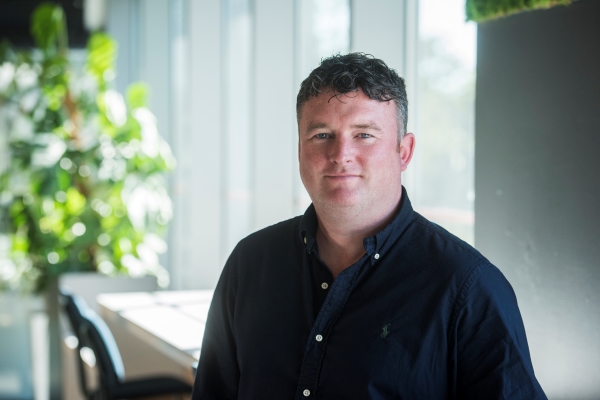As CEO of tech innovation hub Plexal, Andrew Roughan spends a lot of time thinking about scaling. He is motivated to help startups based at Plexal’s East London co-working space grow. He is concerned by the macroeconomic environment for scaling UK companies. And now, his focus is on scaling Plexal in the next stage of its growth journey.
Plexal sits within the Here East campus, a project born out of the 2012 London Olympic Games legacy to transform the media complex located near Hackney Wick into a tech innovation hub.
Plexal officially opened in 2017 and provides bespoke consultancy services for the public and private sectors, along with modern co-working spaces for startups.
The bright and open space, which overlooks Olympic Park, is designed to encourage serendipity.
“We designed this like a city,” says Roughan, who was part of the founding team at Here East. “You’ve got streets and central squares and parks and areas for relaxation, areas for thinking, areas for collaboration.”
Plexal’s primary goal is to facilitate collaboration between the government, startups and larger businesses.
Through government contracts, it runs initiatives like the Cyber Runway programme, an accelerator aiming to improve diversity and inclusion, along with regional representation, among cybersecurity startups and SMEs. Plexal says it has supported more than 170 companies and entrepreneurs over two years of operation, with 50% female-led and 52% based outside of the South East.
Plexal also provides private sector consulting work, sourcing partners from its “ecosystem of 15,000 connections”. One such example is its role as European scouting partner for Amazon Web Services to help the tech giant find talent to build in the cloud.
Roughan says that its consulting businesses provide around three-quarters of Plexal’s approximately £11m in revenue, with the remainder coming from co-working space leases.
Plexal’s core focus
Plexal works with companies operating in three core areas: national security, emerging technology, and prosperity.
Roughan says that the prosperity category was tweaked from social inclusion and mobility because investors were hesitant.
“Everyone wants to talk about it,” Roughan explains. “Very, very few people will fund project projects of change.”
He adds that making the desired change as specific as possible, with a clear goal and an outcome, has boosted support. “For example, we might have used the banner ‘social inclusion’ three years ago, four years ago. What we’re now saying is ‘how to drive gender and race diversity into technology sectors’.”
Roughan says that improving access to talent, cultivating relationships between universities and startups, and access to finance – particularly in the more “bleeding edge” domains – are the key pain points experienced by the startups he works with.
These issues are common challenges for scaling companies, and it is this later-stage growth that Roughan believes should be the government’s focus area in its goal to become a science and technology superpower.

“I think the UK punches well below its weight from the conversion from high-end research, intellectual property, company formation and then company scaling, particularly in tech,” Roughan says. “I think it’s really strong at the first few stages and way below its potential at the latter stages.”
Amid concerns around tech companies overlooking the UK – as demonstrated by semiconductor company Arm’s US listing – Roughan says “getting the cycle right” and “getting that growth engine going” is key to attracting global organisations to the UK.
Opening up domestic supply chains to startups and scaleups is one area that could support this, Roughan says.
“At the moment, if you look at all the big sectors across the economy, all the big tech companies dominate them,” he explains. “And we’ve got to get a way of big companies working with small companies efficiently either by integrating their products and making their products more agile and creative, or by allowing startups to expose themselves to clients.”
Where next?
Plexal has been privately funded by one shareholder that it shares with Here East – a joint venture led by clients of real estate firm Delancey.
Like a startup moving away from growth funding, Plexal is now focused on self-sufficiency and profitability. Roughan says Plexal is “just about break even now” and the goal is to move into profitability over the next few years and double revenue to over £20m.
Roughan adds that Plexal will be “doubling down” on its core areas of national security, emerging tech and prosperity.
The innovation firm has its eye on expansion, too. In January, Plexal acquired Hub8, a Cheltenham-based cyber and tech co-working space. The goal is to build its presence in the South West, adding to Plexal’s site in Manchester.
Plexal has 72 people working across its sites, a figure that Roughan is also aiming to double over the next two to three years.
“We’re on our own startup journey, ironically,” he says.
The post Plexal: How the East London startup hub is scaling tech innovation appeared first on UKTN | UK Tech News.



